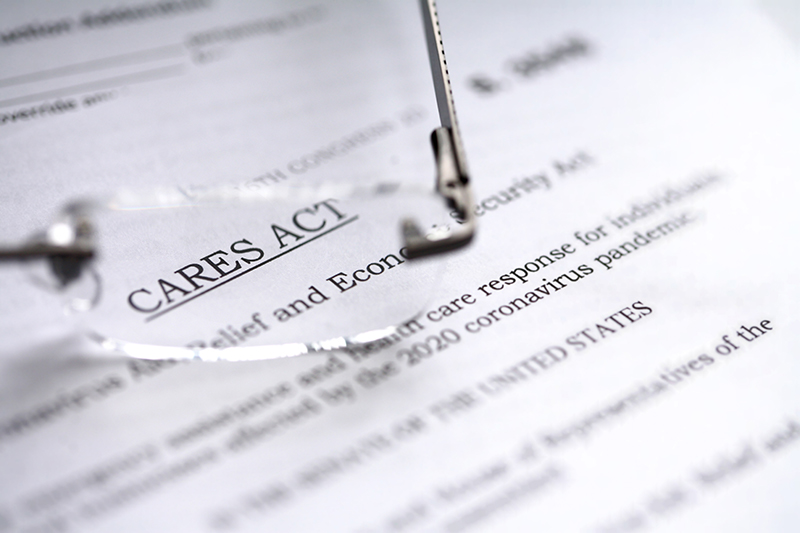April 29th, 2020
From Eligibility to Child Support: Stimulus Check FAQ
Posted in: Family Law Tax Law Tagged: Coronavirus

The 2020 Coronavirus Aid, Relief and Economic Security Act (CARES Act) includes a provision allowing some Americans to receive funds directly from the government to help cushion the economic damage inflicted by the COVID-19 pandemic. The IRS has already started to send out some of the direct payments, but there are some procedures to follow in case you haven’t received your check just yet. Below are some of the most common questions and answers:
What exactly is it?
The stimulus check is an advance of a refundable tax credit against your 2020 taxes – it is not an advance on your tax refund for the 2019 or 2020 tax years, so it will not decrease the tax refund to which you are entitled for the 2019 or 2020 tax years. Generally, tax credits serve only to reduce a taxpayer’s tax liability, potentially down to $0. Any remaining credit amount is usually lost. However, when a tax credit is refundable, it means if the credit offsets a taxpayer’s tax liability completely and there is still some credit amount remaining, that remaining credit amount is actually paid to the taxpayer. §2201(a).
Will I get a stimulus check? If so, how much will I get?
Eligible individuals are defined as any individual other than (1) any nonresident alien individual; (2) any individual who can be claimed as a dependent by another person, and (3) an estate or trust. §6428(d)1(1-3). Furthermore, receipt of a stimulus check is limited based on your adjusted gross income (AGI). Assuming they are otherwise eligible, taxpayers filing single with AGI under $75,000, and taxpayers filing as head of household with AGI under $112,500, qualify for a $1,200 stimulus rebate. Married taxpayers filing jointly with AGI under $150,000 qualify for a $2,400 stimulus rebate. Additionally, taxpayers are eligible to receive an additional $500 for each dependent child.
Even if a taxpayer qualifies for a stimulus rebate, the amount to which a taxpayer is entitled begins to decrease as the taxpayer’s AGI increases past a certain level; the stimulus rebate amount shall be reduced by 5% of so much of the taxpayer’s AGI as exceeds $150,000 for joint return filers, $112,500 for head of household filers, and $75,000 for single filers. Because the stimulus rebate is actually an advance of a refundable credit for the 2020 tax year, if a taxpayer’s AGI is too high to qualify for the rebate in the 2019 tax year, the taxpayer may still qualify for it in 2020 if the taxpayer’s AGI decreases sufficiently. Additionally, if a taxpayer’s 2020 AGI turns out to be higher than it was in 2019, and as a result, the stimulus rebate amount for which the taxpayer qualifies for the 2020 tax year is less than the amount the taxpayer qualified for in the 2019 tax year, the taxpayer does not have to pay back the difference. §2201(c)(1-3).
When will I get it?
Direct deposit payments have already started to be sent. Paper checks will start to be mailed in May. No refund or credit shall be made or allowed after December 31, 2020. §6428(f)(3)(A).
How do I get it?
If you have filed your 2019 or 2018 tax return, the IRS will use that information to calculate your payment amount, and to determine your bank account information (for direct deposit) or your address (for mailed checks).
If your address or bank account information has changed since the last time you filed your taxes, you can update that information using the IRS’s “Get My Payment” tool.
What if I didn’t file a tax return in 2019 or 2018?
If you didn’t file because your income is derived social security and you don’t need to file a tax return, the IRS will process the refund with the information provided in your form SSA-1099 or Form RRB-1099. §6428(f)(5)(B)(i-ii).
If you didn’t file because you are not required to file a tax return for any other reason, you can enter your payment information.
How can I track it?
You can track your return via the IRS’s “Get My Payment” tool.
I’m using the Get My Payment Tool, but I am being told “Payment Status not Available.”
The Payment Status Not Available error can arise for a number of reasons:
- You are required to file a tax return for 2018 or 2019, but have not done so yet (or you have recently filed and the IRS has not processed it).
- You don’t normally file a tax return, and the IRS has not yet processed the info that you provided to them.
Is it taxable?
Insofar as the stimulus check is a tax credit, it is not taxable income to the recipient.
I’m in the middle of a divorce. Is the stimulus check marital property?
The stimulus check is a tax credit against income earned in 2020. Just like any other income earned, it is marital property per MD Code Ann., Family Law §8-201(e)(1).
I am in child support arrears, and have not received my check. Why not?
While the CARES Act prohibits governments from withholding the stimulus check payments for most reasons (e.g. if you owe back taxes or have set up a payment plan with the IRS), child support arrears is a notable exception. If your Stimulus Check is offset by past-due child support, you will receive a notification so stating.





